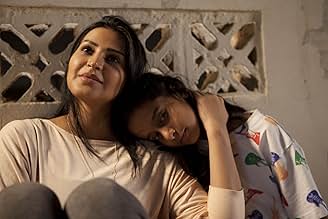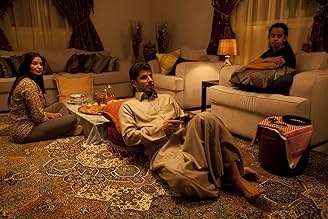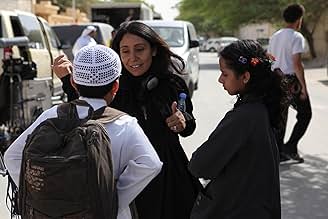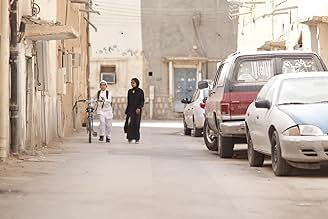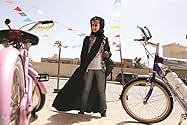IMDb-BEWERTUNG
7,5/10
22.006
IHRE BEWERTUNG
Ein Mädchen in Saudi-Arabien meldet sich beim Koranwettbewerb ihrer Schule an, um das erforderliche Geld für ein grünes Fahrrad zu sammeln, das sie unbedingt haben möchte.Ein Mädchen in Saudi-Arabien meldet sich beim Koranwettbewerb ihrer Schule an, um das erforderliche Geld für ein grünes Fahrrad zu sammeln, das sie unbedingt haben möchte.Ein Mädchen in Saudi-Arabien meldet sich beim Koranwettbewerb ihrer Schule an, um das erforderliche Geld für ein grünes Fahrrad zu sammeln, das sie unbedingt haben möchte.
- Regie
- Drehbuch
- Hauptbesetzung
- Nominiert für 1 BAFTA Award
- 22 Gewinne & 36 Nominierungen insgesamt
Abdullrahman Al Gohani
- Abdullah
- (as Abdullrahman Algohani)
Sara Al Jaber
- Leila
- (as Sara Aljaber)
Empfohlene Bewertungen
10-year-old Wadjda lives in Saudi Arabia. She's a bit rebellious, which means she wears basket shoes in school, listens to Western rock at home and has befriended a boy her own age. But she mustn't sing too loud, because the men can hear her and get offended.
Wadjda wants to go further and have her own bicycle, which invites trouble in her country. The story is told in a very warm way and you learn one thing. People in cultures totally different from yours are very much like you.
Realism here. Everyday people having everyday problems, but not the problems you have. A humanistic film, which makes it concerning everybody.
Wadjda wants to go further and have her own bicycle, which invites trouble in her country. The story is told in a very warm way and you learn one thing. People in cultures totally different from yours are very much like you.
Realism here. Everyday people having everyday problems, but not the problems you have. A humanistic film, which makes it concerning everybody.
We went to see this as a family, with our two daughters, 14 and 16. We all enjoyed it. Seeing how the limitations placed on women in Saudi Arabia play out in everyday life was of great interest to all of us. The story line depicted not only Wadjda's efforts to break free from her circumscribed world, but also how adult women struggle to survive. The effort to simply support oneself without a man when one can't even drive or wear clothes that allow for mobility reflects how rules ostensibly meant to "protect" women keep them dependent on men for the most rudimentary basics.
I suspect that even this film does not depict the lives of women in Saudi Arabia completely accurately. Some concessions seem to have been made to the government. No religious police are to be seen, for example. Nonetheless, it is well worth seeing, and we applaud Haifaa al-Mansour for making it. We look forward to her future work.
I suspect that even this film does not depict the lives of women in Saudi Arabia completely accurately. Some concessions seem to have been made to the government. No religious police are to be seen, for example. Nonetheless, it is well worth seeing, and we applaud Haifaa al-Mansour for making it. We look forward to her future work.
A poignantly triumphant movie, the storyline of "WADJDA" is just as phenomenal as the story of how the film came to be. In short, "WADJDA" represents quite a number of firsts. It's the first feature film shot entirely in Saudi Arabia, a country where cinema is prohibited. Writer and director Haifaa Al Mansour is Saudi Arabia's first female filmmaker. It is also the first submission from Saudi Arabia for the Foreign Language Category for the 2014 Academy Awards.
Set in a country known for its repression of women, the movie follows our title character—a 10-year-old spirited girl—in her journey to buy a new bicycle so she can race her best friend, neighbor and crush Abdullah. Even though Wadjda's mother warns her to stay away from both bikes and boys because of their culture's strict customs, Wadjda is determined to buy her bike with her own hard-earned money, no matter what the consequences. This, in turn, leads to joining a Koran competition at school. If she wins, she will have more than enough to buy a bike and therefore beat the boy next door.
Subtly, the film explores the repercussions from this society in which girls should only be seen, not heard and, in public, only their eyes should be seen, with the rest of their faces covered by black veils. Wadjda tests boundaries in her search for freedom of expression. Although she discovers the contradictions in her world, she's determined to challenge women's traditional roles. The movie covers major topics such as polygamy and child-brides, as well as smaller oppressions such as the restriction of driving and rules of women in the presence of men.
It's mind-blowing to me that a movie about the oppression of women was made in the exact environment it depicts. On DVD, the making-of featurette explores in-depth the struggles and challenges that faced director Haifaa Al Mansour. The line, "respectable girls go inside," is said to Wadjda in the film, and Mansour confronted the same problems. She had to direct her cast out-of-sight using a walkie-talkie to communicate with her cast and a monitor to watch the filming. She could not be seen working with men and often, when religious officials would come to inspect the bustle, production would be halted and moved to another location. It took close to five years to make the movie, but the effort is worth it.
First timer Waad Mohammed is perfect as the fun-loving rebel Wadjda. This film is rated PG and I recommend it for ages 10 to 18. The pace may be slow for kids under ten. This is truly a landmark film that the world needs to watch. I give it five out of five stars. Perhaps the most uplifting message is that although the plot is fiction, the remarkable story behind the movie is not, and that shows that revolution is possible. This film played in theaters last year and will be released on February 11 on DVD/Blu-ray.
Reviewed by KIDS FIRST Film Critic Cassandra H. For more youth reviews go to kidsfirst dot org.
Set in a country known for its repression of women, the movie follows our title character—a 10-year-old spirited girl—in her journey to buy a new bicycle so she can race her best friend, neighbor and crush Abdullah. Even though Wadjda's mother warns her to stay away from both bikes and boys because of their culture's strict customs, Wadjda is determined to buy her bike with her own hard-earned money, no matter what the consequences. This, in turn, leads to joining a Koran competition at school. If she wins, she will have more than enough to buy a bike and therefore beat the boy next door.
Subtly, the film explores the repercussions from this society in which girls should only be seen, not heard and, in public, only their eyes should be seen, with the rest of their faces covered by black veils. Wadjda tests boundaries in her search for freedom of expression. Although she discovers the contradictions in her world, she's determined to challenge women's traditional roles. The movie covers major topics such as polygamy and child-brides, as well as smaller oppressions such as the restriction of driving and rules of women in the presence of men.
It's mind-blowing to me that a movie about the oppression of women was made in the exact environment it depicts. On DVD, the making-of featurette explores in-depth the struggles and challenges that faced director Haifaa Al Mansour. The line, "respectable girls go inside," is said to Wadjda in the film, and Mansour confronted the same problems. She had to direct her cast out-of-sight using a walkie-talkie to communicate with her cast and a monitor to watch the filming. She could not be seen working with men and often, when religious officials would come to inspect the bustle, production would be halted and moved to another location. It took close to five years to make the movie, but the effort is worth it.
First timer Waad Mohammed is perfect as the fun-loving rebel Wadjda. This film is rated PG and I recommend it for ages 10 to 18. The pace may be slow for kids under ten. This is truly a landmark film that the world needs to watch. I give it five out of five stars. Perhaps the most uplifting message is that although the plot is fiction, the remarkable story behind the movie is not, and that shows that revolution is possible. This film played in theaters last year and will be released on February 11 on DVD/Blu-ray.
Reviewed by KIDS FIRST Film Critic Cassandra H. For more youth reviews go to kidsfirst dot org.
One thing that makes this movie stands out is the fact that it is entirely based in Saudi Arabia.
Regardless what one thinks of that country, be that knowledge or just stereotyping, it has a culture that is very different than that of what the western audience is accustomed to.
So he have a heroine who is your typical rebel teenage girl, who has realised that being a woman can be challenging and she therefore must give her fight to survive. The story revolves around an utterly sinful desire this young revolver has: to buy and ride a bicycle. To go about that, she must overcome her mum's objections, the shopkeeper's and pretty much everyone she is acquainted with.
Unprepared to simply accept fate, she is prepared to do whatever it takes to ride that bicycle. Quirky and witty, this is a delight and one should not allow any preconceived notions of Arabic culture to stand in the way of enjoying this pleasurable debut.
Wadjda is a hero in any culture.
Regardless what one thinks of that country, be that knowledge or just stereotyping, it has a culture that is very different than that of what the western audience is accustomed to.
So he have a heroine who is your typical rebel teenage girl, who has realised that being a woman can be challenging and she therefore must give her fight to survive. The story revolves around an utterly sinful desire this young revolver has: to buy and ride a bicycle. To go about that, she must overcome her mum's objections, the shopkeeper's and pretty much everyone she is acquainted with.
Unprepared to simply accept fate, she is prepared to do whatever it takes to ride that bicycle. Quirky and witty, this is a delight and one should not allow any preconceived notions of Arabic culture to stand in the way of enjoying this pleasurable debut.
Wadjda is a hero in any culture.
The total lack of films that come out of Saudi Arabia made Wadjda, a Saudi film by Haiffa Al- Mansour, instantly alluring. Haiffa Al-Mansour is already accredited as being the first successful woman filmmaker in Saudi Arabia's history.
This is very much Al- Mansour's film. She charms the viewer with the common everyday struggles of the Saudi woman, and rather than address the issues in a combative way, her approach is warm, even cute. This draws us in to her characters and provides us with some heartfelt laughs along the way.
The precocious 10-year Wadjda is growing up in Riyadh where she wants nothing more than a shiny new bicycle, but not only is she a little short on riyals, in Saudi Arabia women do not to ride bicycles. Saudi moral code bans woman from driving, going out in public unveiled, living unaccompanied, leaving the country alone, and opposing their husbands' orders in any way.
Small details make grand impressions: In an all girls school teenage students paint their toenails, a sin, and are publicly vilified for it. The mere possibly that workmen half a mile away might see school girls playing in their courtyard forces all the girls to rush inside, lest they be judged impure. Pubescent girls are considered impure and must use a tissue just flip the pages of Koran.
Wadjad's truly beautiful mother spends much of her time perfecting her appearance only then to have to then cover herself with a full hijab. She is never openly defiant; defiance is impossible, but even thought she is obeying age old traditions that we'd assume would have dulled any emotional protest, through the mother's submission we get a brief glimpse of her distress, the natural human emotional distress that no amount of "aged tradition" or religious subjugation has the right to inflict on any human being.
In a country where cinemas are banned, Riyadh is not exactly a city where women can just go around shooting films. Females mixing with male co-workers would bring dire consequences. Al-Mansour shot the film anyway, directing much of it from the back of a van, and the result is a film representing the triumph of the defiant feminine spirit, in all forms.
For more film reviews visit getthebonesaw.blogspot.com
This is very much Al- Mansour's film. She charms the viewer with the common everyday struggles of the Saudi woman, and rather than address the issues in a combative way, her approach is warm, even cute. This draws us in to her characters and provides us with some heartfelt laughs along the way.
The precocious 10-year Wadjda is growing up in Riyadh where she wants nothing more than a shiny new bicycle, but not only is she a little short on riyals, in Saudi Arabia women do not to ride bicycles. Saudi moral code bans woman from driving, going out in public unveiled, living unaccompanied, leaving the country alone, and opposing their husbands' orders in any way.
Small details make grand impressions: In an all girls school teenage students paint their toenails, a sin, and are publicly vilified for it. The mere possibly that workmen half a mile away might see school girls playing in their courtyard forces all the girls to rush inside, lest they be judged impure. Pubescent girls are considered impure and must use a tissue just flip the pages of Koran.
Wadjad's truly beautiful mother spends much of her time perfecting her appearance only then to have to then cover herself with a full hijab. She is never openly defiant; defiance is impossible, but even thought she is obeying age old traditions that we'd assume would have dulled any emotional protest, through the mother's submission we get a brief glimpse of her distress, the natural human emotional distress that no amount of "aged tradition" or religious subjugation has the right to inflict on any human being.
In a country where cinemas are banned, Riyadh is not exactly a city where women can just go around shooting films. Females mixing with male co-workers would bring dire consequences. Al-Mansour shot the film anyway, directing much of it from the back of a van, and the result is a film representing the triumph of the defiant feminine spirit, in all forms.
For more film reviews visit getthebonesaw.blogspot.com
Wusstest du schon
- WissenswertesBecause of restrictions placed on women in Saudi Arabia, director Haifaa Al-Mansour was not allowed to interact with her mostly male crew. She had to direct the street scenes from a nearby van, watching through a monitor and giving instructions via walkie-talkie.
- PatzerWhen Wadjda takes the bread out of the oven, mic equipment is visible on her waist, under her T-shirt.
- VerbindungenFeatured in At the Movies: Venice Film Festival 2012 (2012)
- SoundtracksDead Island
© Copyright 2012 and Published by Deep Silver, a division of Koch Media
Gmbh, Gewerbegebiet 1, 6604 Hofen, Austria.
Developed 2011, Techland Sp, z.o.o., Poland,
© Copyright 2012, Chrome Engine, Techland Sp. z.o.o.
Top-Auswahl
Melde dich zum Bewerten an und greife auf die Watchlist für personalisierte Empfehlungen zu.
Details
Box Office
- Bruttoertrag in den USA und Kanada
- 1.347.747 $
- Eröffnungswochenende in den USA und in Kanada
- 41.253 $
- 15. Sept. 2013
- Weltweiter Bruttoertrag
- 6.499.169 $
- Laufzeit1 Stunde 38 Minuten
- Farbe
- Sound-Mix
- Seitenverhältnis
- 1.85 : 1
Zu dieser Seite beitragen
Bearbeitung vorschlagen oder fehlenden Inhalt hinzufügen








